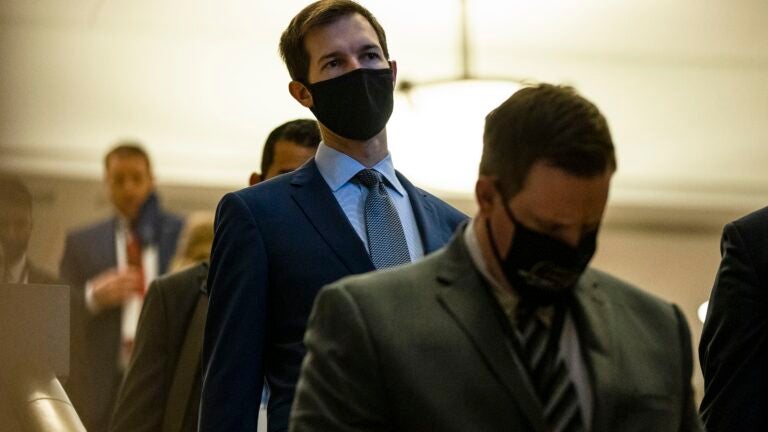A monumental ‘whirlwind’: Jake Auchincloss on his first days as Massachusetts’s newest member of Congress
"It's a moment that makes me feel both small and big at the same time."

Rep. Jake Auchincloss was sworn in as the newest, and youngest, member of the Massachusetts congressional delegation on Sunday.
By his own description, it’s been a “whirlwind,” for better or worse.
Auchincloss, a 32-year-old former Newton city councilor and Marine veteran, narrowly won a crowded Democratic primary race to replace Rep. Joe Kennedy III, who launched an unsuccessful bid for Senate. Auchincloss later coasted to victory in the general election to represent the 4th District, which sprawls from the western Boston suburbs to the Massachusetts-Rhode Island border.
Getting to experience his first day as a member of Congress alongside his father (who is second in command behind Dr. Anthony Fauci at the National Institute of Allergy and Infectious Diseases) was “deeply meaningful,” Auchincloss told Boston.com in an interview.
However, he’s arriving in Washington, D.C., during a week that he thinks will be remembered as “the nadir of American democracy” due to the seemingly futile efforts by some Republicans to challenge the presidential results as the COVID-19 pandemic continues to rage.
“It feels grim,” Auchincloss said. “And yet I’m also optimistic that it’s going to get better.”
The interview has been lightly edited and condensed for clarity.
You’re arriving in Congress at a pretty unusual time, between the pandemic and Republicans challenging the results of the presidential election. But at the same time it must be a pretty monumental moment for you personally. What have these first few days been like?
For me, personally, it’s of course, as you said, a monumental moment.
My dad picked me up at the airport — he lives in Washington, he picked me up at the airport a couple of days ago before the swearing in — and we were reflecting on the drive in that it was 10 years ago that he had picked me up from the airport to go back to basic officer training in Quantico, Virginia, for the Marines. And it was sort of a similar sense of nerves and anxiety, but also an intense optimism and motivation. I’m going into something hard. I’m going into something that will test me, but also something that’s bigger than myself and that allows me to contribute to the national project in a way that I find meaningful.
Before I walked into the House chamber to get sworn in, my dad and I sat looking at the giant picture of the signing of the Constitution, which feels especially poignant this week, and it’s a moment that makes me feel both small and big at the same time, if that makes sense. I’m such a small part of this national story, and yet what a monumental and important stewardship I have to support and defend the Constitution, this most important document. So it’s been a whirlwind, and a really deeply meaningful one for me
On the political side, I think that this week, in the years to come, is going to be seen as really the nadir of American democracy. It is a time when we are staggering to competently roll out vaccines, while the body count from this pandemic continues to rise. And meanwhile we are grappling with a manufactured constitutional crisis, because of Republican subservience to a petulant would-be tyrant. It feels grim. And yet I’m also optimistic that it’s going to get better.
It’s going to get better in the short term because we’re going to have a president who is going to roll out a million vaccinations a day for the first 100 days, and he’ll have Congress’s support to do that.
It is going to get better in the longer run because, I think, a new generation, a millennial generation, of elected leaders are going to work to restore moral courage in Congress, so that we can take on these existential challenges of creating good clean energy jobs to fight climate change, confronting racial injustice and being true to our creed of equal opportunity for all, building an economy that works for everyone. These are projects that, as a millennial myself, I am excited to take on in the years ahead and that I’m optimistic there’ll be increasing urgency and unity behind.
I noticed that one of your first official acts as a member of Congress was to sign onto the resolution to censure Trump for his phone call pressuring the Georgia secretary of state to recalculate the presidential election results. Is that enough?
Well, if he weren’t already out the door, that on its own would be enough to start drawing up articles of impeachment.
What should really be the focus in terms of that call and, in general, I think with this week, in terms of the constitutional crisis that’s being manufactured, is not on President Trump. We know who and what President Trump is. We’ve known it since before 2016 when he said he wouldn’t respect the results for that election, if he weren’t successful. Nothing should be surprising about what he’s doing. He’s told us who he is, he’s shown us what he is.
The onus is on congressional Republicans. Will they put country and Constitution first? And their failure to do so is going to reverberate in the history books.
Beyond Trump, I know you touched a little bit of your priorities heading into this year, but what do you think needs to be in the next response bill?
More money for testing in the schools and relief for state and local governments.
I’ve been working since the election on expanding access to pooled PCR testing for the public schools in my district. I wrote an op-ed in the Globe relaying the core points a couple of days ago.
And there’s two levers to that. There is the money to do it and that money is starting to get to the right places, although not fast enough. Then there’s also the sort of operational component. Public school officials are not public health officials, and they need program management support to do mass pool testing to create the competence and the transparency that parents, students, and teachers need to get back to in-person learning.
And this isn’t just solely a federal issue, of course. This is really federal, state, and local. And it’s actually an area where I think I can have impact, because I have good relationships with state officials in my district. I’m a former local official, and of course I’m now a federal official. I can work across federal, state, and local lines to connect money with program management.
So COVID testing in the schools, number one. Number two is just direct relief to state and local governments. State and local government budgets are lagging indicators of economic recession. The upcoming fiscal year is going to be harder than the last one. The rainy day funds are not as topped off as they were when they were first dipped into, and we just cannot allow cuts to essential services, including education, to be on the table, after the year that we just had and the year the parents and students and teachers just had.
What are your thoughts on the back and forth here in Massachusetts between Gov. Charlie Baker’s administration, which has pushed local school officials to resume in-person learning, and many teachers and parents who are worried about doing so amid such high rates of COVID-19?
I think it’s a back and forth that reflects the fact that there’s sort of a missing program management piece here. Both sides are saying very accurate things.
I think the Baker administration’s point that getting kids back to in-person learning is an economic and a moral imperative I agree with. I think what local officials and parents and teachers are saying, like, ‘Whoa, we don’t know that we feel confident to do that,’ is also a very fair point. Like neither side is saying anything incorrect.
What’s missing is a program management component that says, let’s put in a mass pool testing regime that creates transparency and confidence for all stakeholders such that, as we resume in-person learning and get back to full in-person learning, we’re looking at the same data about spread in these schools. Everybody can question it and we know who the decision makers are if we decide that we’re reaching a point where we have to go back to remote. So we’re having a very healthy deliberation, but we’re missing the program management component that can allow it to be an actionable deliberation.
One other thing on the sort of next round of coronavirus relief. The proposal to send $2,000 direct payments to most individuals recently became a flashpoint. Is that something that you think needs to be in whatever the next relief bill is? Or is there a better way to address the individual economic hardships that people are going through?
Things are moving so fast that we need to have this debate when this bill comes on the floor. We need to evaluate what the state of unemployment is, we need to evaluate what the state of vaccination distributions are, we need to evaluate how this latest relief package is being distributed. Let’s use the most up-to-date data that we have and then have the debate and make the decisions about the appropriate package.
Any big surprises so far? I know it’s only been two days, but is there anything you’ve seen or experienced in D.C. that you didn’t expect?
How much walking there is back and forth for the votes. I’m in the [Longworth House Office Building]. I’m racking up like 15,000 steps a day getting back and forth.
There’s no subway to Longworth, is there?
There’s not. And I don’t know that I really factored that into my conception of what life in Congress was like.
One last question: I read that you were getting the COVID-19 vaccine on Monday. What was that like?
It was professional, painless, and really to me reflects the fact that science did the impossible over the last nine months. And we owe a tremendous debt of gratitude to the scientists and the engineers and the chemists, who— many of whom were in Massachusetts — applied the very best of American ingenuity to a problem with existential consequences. And it should be reminder to us here in Massachusetts that the life sciences are a tremendous crown jewel in our state economy.
Get Boston.com's browser alerts:
Enable breaking news notifications straight to your internet browser.








Conversation
This discussion has ended. Please join elsewhere on Boston.com